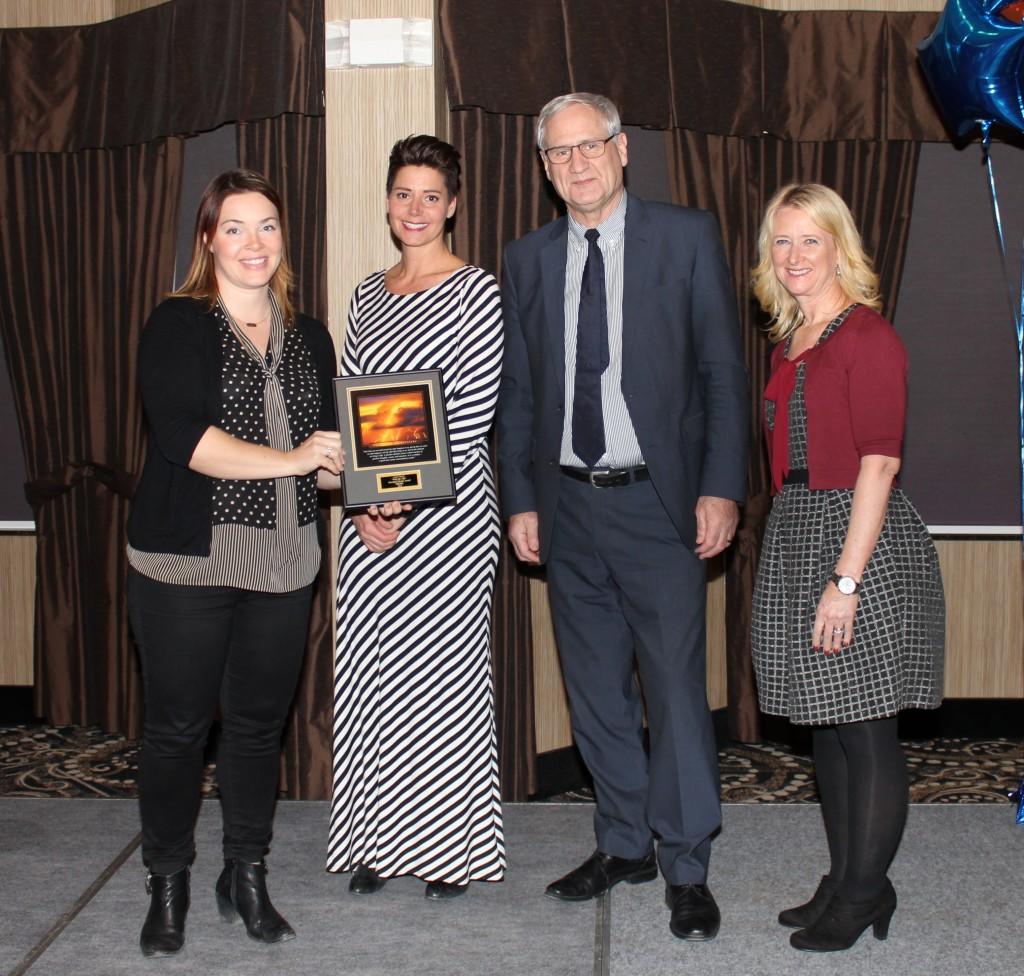Walking the Talk for Aboriginal Health
by Maryanne Matthews
 TBRHSC congratulates Lauren Beach (left) on her Walk the Talk Award for Aboriginal Health. Lauren’s dedication and commitment to the Screen for Life Coach and its services to Northern communities has made a significant and positive impact on the health of our Aboriginal patients.
TBRHSC congratulates Lauren Beach (left) on her Walk the Talk Award for Aboriginal Health. Lauren’s dedication and commitment to the Screen for Life Coach and its services to Northern communities has made a significant and positive impact on the health of our Aboriginal patients. Lauren Beach Walks the Talk. Beach is the Mobile Coach Lead, Prevention and Screening, at the Thunder Bay Regional Health Sciences Centre (TBRHSC) who was nominated by her peers for a Walk the Talk Award. Each year, TBRHSC distributes Walk the Talk Awards in a number of categories to acknowledge and reward employees and physicians who go above and beyond in their work.
Beach was selected by a review panel for the Aboriginal Health award, which goes to an individual who is committed to excellence in Aboriginal healthcare delivery by improving the physical and cultural environments at TBRHSC to reflect the expressed values, practices and traditions of Aboriginal patients and families.
It was Beach’s perseverance and determination as the lead for the Screen for Life Coach that garnered her the award. The coach provides women with access to three organized cancer screening programs; breast, cervical, and colorectal. It travels across Northwestern Ontario – including remote First Nations communities – where the geographic distance from hospitals has typically kept rates of these potentially life-saving screenings down.
“Screening leads to early detection of cancer, which will often be the difference between surviving from or dying of cancer,” said Beach. “We need to do as much as we can to ensure access to screening in our geographically challenging area is as equitable as possible.”
When Beach started as the Mobile Coach Lead nearly three and a half years ago, she embraced the need to engage and empower Aboriginal communities to increase the number of women taking advantage of TBRHSC’s screening services – something she says she’s been very honoured to do.
“Not only is it within my mandate to do so, but it’s a privilege to be able to work closely with First Nations communities, earn their trust, and learn from them about how they want to receive our services,” says Beach. “It’s an ongoing process of identifying what has worked in the past and how we can build on those successes together. We’ve adopted a very community driven approach with the coach – the community designs how they want our services to run and how the services should be promoted based on the uniqueness of the people. Our goal is to build on the strengths of each community and be as flexible and responsive as we can to address specific needs.
Everything we’ve accomplished, we’ve accomplished as a team.
– Lauren Beach
Leading the Mobile Coach is definitely a challenging task given the volume and diversity of communities that require access to screening services. Rather than be discouraged, Beach tackles this challenge with enthusiasm and an eagerness to constantly improve and evolve they way screening services are provided. Building on the work that the Coach has been doing with communities for a number of years , as of 2014 the program has expanded its schedule in include more than 25 new First Nation communities and works with over 45 First Nation communities in the Northwest.
“There are a lot of complex factors that contribute to the health of our Aboriginal people so we always need to stretch the way we think about healthcare delivery and look for innovative ways to approach Aboriginal health if we want to see improvements,” she explains. “I’m very proud to be working in an organization, and within a department (Prevention and Screening) that understands and embraces the importance of Aboriginal Health.”
Beach says she shares her Walk the Talk award with all the hard working people in the Northern communities, as well as the Coach staff that go into the communities and do the important work. “Everything we’ve accomplished, we’ve accomplished as a team.”
To learn more about the Screen for Life Coach, visit www.tbrhsc.net/screenforlife.